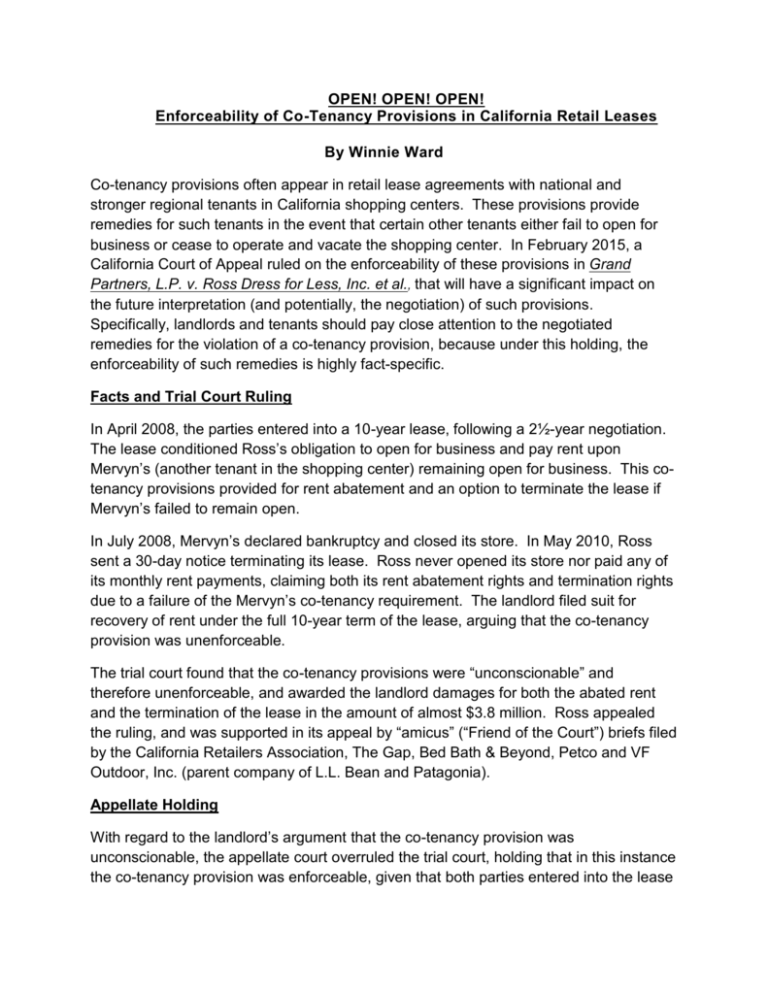OPEN! - Stewart Ward & Josephson LLP
advertisement

OPEN! OPEN! OPEN! Enforceability of Co-Tenancy Provisions in California Retail Leases By Winnie Ward Co-tenancy provisions often appear in retail lease agreements with national and stronger regional tenants in California shopping centers. These provisions provide remedies for such tenants in the event that certain other tenants either fail to open for business or cease to operate and vacate the shopping center. In February 2015, a California Court of Appeal ruled on the enforceability of these provisions in Grand Partners, L.P. v. Ross Dress for Less, Inc. et al., that will have a significant impact on the future interpretation (and potentially, the negotiation) of such provisions. Specifically, landlords and tenants should pay close attention to the negotiated remedies for the violation of a co-tenancy provision, because under this holding, the enforceability of such remedies is highly fact-specific. Facts and Trial Court Ruling In April 2008, the parties entered into a 10-year lease, following a 2½-year negotiation. The lease conditioned Ross’s obligation to open for business and pay rent upon Mervyn’s (another tenant in the shopping center) remaining open for business. This cotenancy provisions provided for rent abatement and an option to terminate the lease if Mervyn’s failed to remain open. In July 2008, Mervyn’s declared bankruptcy and closed its store. In May 2010, Ross sent a 30-day notice terminating its lease. Ross never opened its store nor paid any of its monthly rent payments, claiming both its rent abatement rights and termination rights due to a failure of the Mervyn’s co-tenancy requirement. The landlord filed suit for recovery of rent under the full 10-year term of the lease, arguing that the co-tenancy provision was unenforceable. The trial court found that the co-tenancy provisions were “unconscionable” and therefore unenforceable, and awarded the landlord damages for both the abated rent and the termination of the lease in the amount of almost $3.8 million. Ross appealed the ruling, and was supported in its appeal by “amicus” (“Friend of the Court”) briefs filed by the California Retailers Association, The Gap, Bed Bath & Beyond, Petco and VF Outdoor, Inc. (parent company of L.L. Bean and Patagonia). Appellate Holding With regard to the landlord’s argument that the co-tenancy provision was unconscionable, the appellate court overruled the trial court, holding that in this instance the co-tenancy provision was enforceable, given that both parties entered into the lease voluntarily and without coercion, even though it acknowledged that Ross did have greater bargaining strength. The landlord further argued that (a) the lease termination clause amounted to a “forfeiture”, and that the landlord therefore should be entitled to damages, and (b) the rent abatement was an unenforceable penalty. As to the forfeiture argument, the Court found that because the lease termination clause has been negotiated between sophisticated parties, and that the landlord had no control over whether Mervyn’s vacated its premises, Ross’s termination of the lease did not amount to a “forfeiture”, and the landlord was not entitled to damages. With regard to the rent abatement provision, however, the Court held that Ross failed to prove that the amount of the rent abatement had any relationship to Ross’s actual “damages” due to Mervyn’s closing. In fact, Ross was unable to prove it had any such damages. Therefore, the landlord was entitled to damages equal to the 13-month rent abatement period at the beginning of the lease term, totaling $672,100, but not the $3.1 million in damages for termination of the lease that the lower court awarded. The Importance of a Well-Drafted Document The takeaway from this case is that the enforceability of co-tenancy provisions are factspecific. In order to enforce a rent abatement remedy, a tenant should be prepared to prove that the rent abated had some relationship to the damages the tenant suffered due to the co-tenancy condition not being fulfilled. Also, whether or not a landlord has the ability to require the co-tenant to remain open might impact the enforceability of a tenant’s termination right, although the court was silent on what impact such control would have on the termination right. Landlords and tenants, and their counsel, should carefully consider the co-tenancy language in future leases in light of this decision. Winnie Ward is a named partner of Stewart Ward & Josephson LLP. She specializes in office, retail and industrial commercial leasing, as well as real property acquisition and divestment. Ms. Ward currently serves as a Director at Large on the Board of Directors for the Association of Commercial Real Estate. wward@swjllp.com; 916-569-8161






